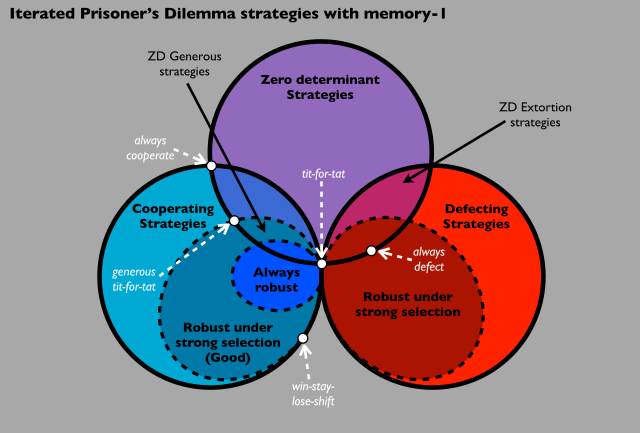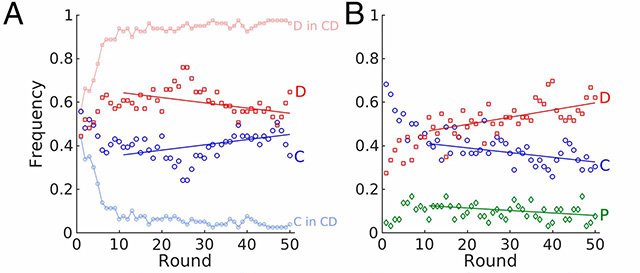Psychologists and social scientists have used prisoner's dilemma game theory to demonstrate how and why people will choose to not cooperate, even though it's in their rational best interest to do so.

Source
In the prisoner's dilemma, betraying a partner offers someone a greater reward compared to cooperating, so people tend to be selfishly motivated to act towards betraying another -- despite there being a greater risk of losing -- compared to both people cooperating for a safer and more positive outcome for both.
People's behavior isn't always purely selfishly motivated. For example, despite the impending danger of a fire, instead of saving themselves, someone can take the time and risk to raise a fire alarm or even help others to evacuate and get out safely. We often favor cooperative behavior over selfish behavior.
In 2017, a new version of the prisoner's dilemma was conducted for a study, which introduced a new choice in addition to cooperation or defection, the choice to punish.
250 students were split into 3 groups and each played 50 rounds of the game. One group had the two opponents changing each round, with only the option to cooperate or defect. The second group had the same two choices, but their opponents remain the same throughout all 50 rounds. The third group also played against the same opponent each round, but the new option of punish was available to them.
If both opponents choose to defect, both receive 0 points. If only one chooses to defect and the other chooses to cooperate, the one who chose to defect gets 8 points. If both choose to cooperate, they both get 4 points. If someone chose to punish another, they would get a small reduction in points as the punisher, and the punishee would receive a large reduction of points. At the end of 50 rounds, points are tabulated and participants are given monetary rewards for their points.
Normally in this model of game theory, the benefit of cooperating is recognized by participants as the way to gain the most points, and that is where the tendency of behavior leads to. The theory and expectation about punishment in this new prisoner's dilemma, is that punishment would be applied in the mentality of "if you don't cooperate with me, I'll punish you", which researchers thought should produce more cooperation in the long term.
When people were constantly changing opponents in the first group, they were more selfishly motivated it seemed, as there was only a 4% cooperation, compared to the second group of static unchanging opponents which produced 38% cooperation. Cooperation did increase over time at the expense of defection, which is what normally happens in prisoner's dilemma games.

But in the third group which included the punish option, instead of having an even higher rate of cooperation, the level of cooperation was at 37%. Less defection was used in the third group that included punishment, so it seems that some players replaced defection with punishment.
The implication of the research is that punishing someone doesn't give the message that "I want you to cooperate", but comes off instead as "I want to hurt you".
Overall, punishment demonstrated a demoralizing affect. Those who receive a punishment on multiple occasions lose a significant portion of their total payoff in a short period of time. This could demotivate players, who then lose interest in the game. Introducing the explicit option of punishment -- as opposed to the implicit "punishment" of choosing defection -- reduces the incentive to choose cooperation, and so the natural progression over time is not that cooperation increases, but that it decreases.
Researchers speculate that in our society, punishment is often exercised by a dominant side who has the ability to punish without provoking retaliation. In the experiment, if the punisher had a larger fine and lost more points -- a larger negative consequence to imposing punishment -- then maybe there would be less punishment.
I find this interesting as it relates to Steemit: the dominant users on the platform are those with the most power, derived from the larger amount of stake/SP/"money" they have on the platform. They can punish anyone with a flag as they see fit, without much direct negative consequence upon themselves, apart from losing voting power that prevents them from applying a potential upvote on another post to gain curation rewards (as flags don't give curation rewards). This isn't much of a negative incentive to not flag in an abusive way if they want to just hurt others.
Many people have been flagged for arbitrary reasons -- like any reason they want -- such as not liking the post content or the person posting, among other justifications. Subsequent repeated abuse of power often ensues. The "spirit" of "I want to hurt you"seems to play out often in the use of the flagging feature on Steemit. As a result, many people become demotivated from playing the Steemit "game", as is what seemed to happen in the above study.
- What is your experience with punishment in the real world?
- Have you been in a position to give out punishment, or receive it, and how did that make you feel?
- How has your experience of flagging been on Steemit (as either someone who gave out or received the flag punishment, or maybe just as an observer of the feature)?
Have your say, let me know what you think!
Thank you for your time and attention. Peace.
Recent posts:
- What is Belief?
- The Power of a Gentle Touch
- Reality, Consciousness and Symbols, and the Identification, Valuation and Attachment to Beliefs
- Cryptocurrencies are Dependent on Bitcoin's Value, but Isolated from Traditional Assets and Markets (For Now)
- A World Where Not Reporting an Illness is a Crime
- The Evolutionary Role of Gossip
If you appreciate and value the content, please consider: Upvoting, Sharing or Reblogging below.
 me for more content to come!
me for more content to come!
My goal is to share knowledge, truth and moral understanding in order to help change the world for the better. If you appreciate and value what I do, please consider supporting me as a Steem Witness by voting for me at the bottom of the Witness page; or just click on the upvote button if I am in the top 50.
In business perspective, back then, being independent entrepreneur can sustain themselves, but nowadays it barely survives. Today, business usually formed as a team to survive, having 100 brains create more capacity than 1 brain alone. :)
Downvoting a post can decrease pending rewards and make it less visible. Common reasons:
Submit
This is not the only way to interpret "selfless" behavior. Sometimes people do things for others because they know they wouldn't be able to live with themselves if they didn't. In that case, it's inherently selfish to help others.
It seems like the alternative dilemma scenario you describe combines Nash Equilibrium with the Shapley Value into one game. I go into those and how I think they relate to Steemit in my article called Game Theory and Steemit.
Downvoting a post can decrease pending rewards and make it less visible. Common reasons:
Submit
Purely selfish, as in with disregard for others, or at other's expense, without consideration for others, etc. Indeed, selfishness with respect to being inclusive -- of recognizing the reality that we are not being/existing on an island alone -- will motivate people to be more inclusive of others to amplify their own well-being and ability to receive benefits from others. I'll check out your post, thanks for sharing and for the feedback :)
Downvoting a post can decrease pending rewards and make it less visible. Common reasons:
Submit
I tried to read about the three groups play but I didn't exactly get what was the purpose of that. If punish had the highest points in game, everybody would try to punish in order to get maximum reward.
As far questions are concerned, I got punishment on almost all the wrong doings during my childhood because my Father was very strict. But with time when I grew up, I found that, punishment was not the solution and that had made me weaker, my morale was so low, self-esteem and self-confidence was almost zero or negative and I was like nothing in my own eyes. But now I'm mature and I'm definitely against punishing anybody because punishment only make the situation worse and it's not the solution. I'm eldest among my siblings but I never treat them in the way I was treated. :(
Downvoting a post can decrease pending rewards and make it less visible. Common reasons:
Submit
Punish doesn't have the highest, it has negatives for yourself and the one being punished, but they get more points taken away than yourself. Defect has the highest point return. You should go read more on the prisoner's dilemma, as I didn't explain it in depth here. It's been done many times ;)
Thank you for the valuable feedback on being punished. I agree it demoralizes and devalues people more often than not. There is also a difference in wrong doings, strict punishment for minor errors in conduct does not help make people better, just more resentful I think.
Downvoting a post can decrease pending rewards and make it less visible. Common reasons:
Submit
Alright, I'll research on prisoners dillema.
You're welcome on appreciating my feedback on being punished ;) Lol.
Downvoting a post can decrease pending rewards and make it less visible. Common reasons:
Submit
Those phrase/sentence above are to me negative effect of punishment. To me punishment should be have 90% of corrective and 10% of pain, but if that not the case the as you said;
The "spirit" of "I want to hurt you"For the question asked punishment has being of correction to me, even if intent of the punisher is to demoralise me, i pick the positive from it and never want my self to be demoralise, i have the right to my feelings get demoralise can lead to depression, i have on the depressive journey once, it a journey i don't want ever take again
Relating the your post to steemit, disavowing the acts of some power users, using power to oppress. Thanks for speaking on this issue
Downvoting a post can decrease pending rewards and make it less visible. Common reasons:
Submit
Yeah, sometimes there needs to be punishment I guess you could say, I view it more as consequences to your actions, as punishments that comeback on you because we do something that is negative and we face the consequences to those actions. Sometimes, punishments are unjust, sometimes they are just ;) Thanks for the feedback.
Downvoting a post can decrease pending rewards and make it less visible. Common reasons:
Submit
There is a difference between being a rat or man/woman in the police questioning.
Prisoner's dilemma only applies to "rats" as guinea pigs.
The "If you point the other that already pointed you" game rewarded with ticket to freedom for selling another human being, guilty or not.
Downvoting a post can decrease pending rewards and make it less visible. Common reasons:
Submit
To rats? In that it isn't a real world demonstration? You are using rat as guinea pig it seems.
The level of motivation is different, but the incentive to cooperate is still comparable. If both criminals keep silent, they have a better change to not get convicted, and possibly go free. If one "rats"/talks about the wrong someone else did, then they get to go free, but if both "rat" on each other, they both go to jail for longer times than both shutting up and cooperating. The prisoner's dilemma game works ont he same principle.
Downvoting a post can decrease pending rewards and make it less visible. Common reasons:
Submit
By the way, my phone got wiped months ago, and I don't have the two-factor auth codes for logging into discord, so I will have to create a new account at some point... my old account is lost forever... :(
Downvoting a post can decrease pending rewards and make it less visible. Common reasons:
Submit
That's why I proposed that we implement a major overhaul and have REP actually mean something, with tiered unlocks of ability to Flag/Counterflag and a separate Curation system that works in tandem with flagging so that people don't have to waste their vp to remove rewards, they can dunce the abuser to the point that they cannot curate let alone post. I Know, very radical, but the dynamics have been considered in my post and there's no contention to it really.
https://steemit.com/community/@baah/a-solution-to-the-downvoting-flagging-problems-on-steemit
Downvoting a post can decrease pending rewards and make it less visible. Common reasons:
Submit
What is to prevent abuse? What negative is applied then to make it less desirable to flag people willy nilly and only lose VP?
Downvoting a post can decrease pending rewards and make it less visible. Common reasons:
Submit
There will be a separate mechanism that is used solely to affect peoples reputation, flags and counter flags. On top of that downvoting to remove rewards I proposed that gets mitigated to using 5x-10x the voting power it currently takes for the same weight dv, since abuse should be dealt with by the members of the community with a certain rep through the flagging system as opposed to curation system.
Downvoting a post can decrease pending rewards and make it less visible. Common reasons:
Submit
Yup, plenty of good ideas, but no consensus in community to apply better ways to deal with abuses, so nothing gets done? Minimum flagging quantity of users based on rep, more weight drain to VP for flags, are all better, yet Steemit doesn't just implement better solutions... it's been over a year with the flag issue and nothing has been done... :/
Downvoting a post can decrease pending rewards and make it less visible. Common reasons:
Submit
Bernie for Ambassador?
Downvoting a post can decrease pending rewards and make it less visible. Common reasons:
Submit
There's also that concept of a Stockholm syndrome: feelings of trust or affection felt in many cases of kidnapping or hostage-taking by a victim towards a captor. Does it apply to steemit communities? Surely
Downvoting a post can decrease pending rewards and make it less visible. Common reasons:
Submit
Good post❤ thank you for sharing
Downvoting a post can decrease pending rewards and make it less visible. Common reasons:
Submit
well i haven't tackle any punishment.
No not given punishment to other.
not yet experienced any flag.
Downvoting a post can decrease pending rewards and make it less visible. Common reasons:
Submit
Nice post @krnel I am Upvote and followed you,, thank for information....

Downvoting a post can decrease pending rewards and make it less visible. Common reasons:
Submit
No! Never!
Punishment can never be a Cooperation.
Punishment can make the person think more about the thing for which he is being punished.
If he punished hard, we will do that thing with his full efforts, besides of thinking whether it is good or not.
I Have an example of my Cousin, he was a brilliant student, really he was, I'm admitting it,
but his father was a strict man, he even punished him for getting 99 out of 100, What the fuck man! 99 are the best anyone could think off, but he beats him badly every time and now the boy I'm talking about have left studies.
It is sad but true.
Now he has become mentally sick!
and i'm worried for him :(
Downvoting a post can decrease pending rewards and make it less visible. Common reasons:
Submit
Interesting!
Downvoting a post can decrease pending rewards and make it less visible. Common reasons:
Submit